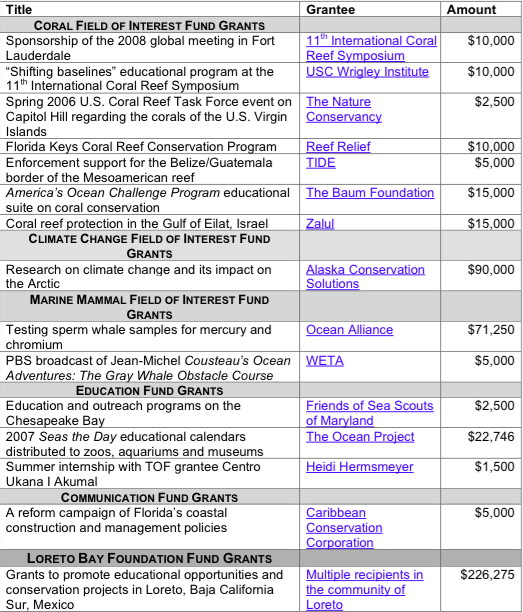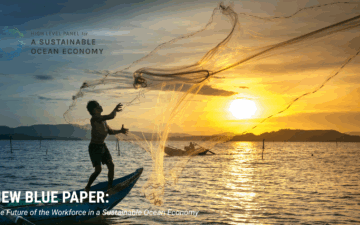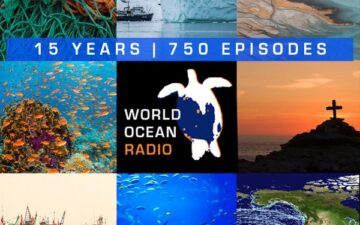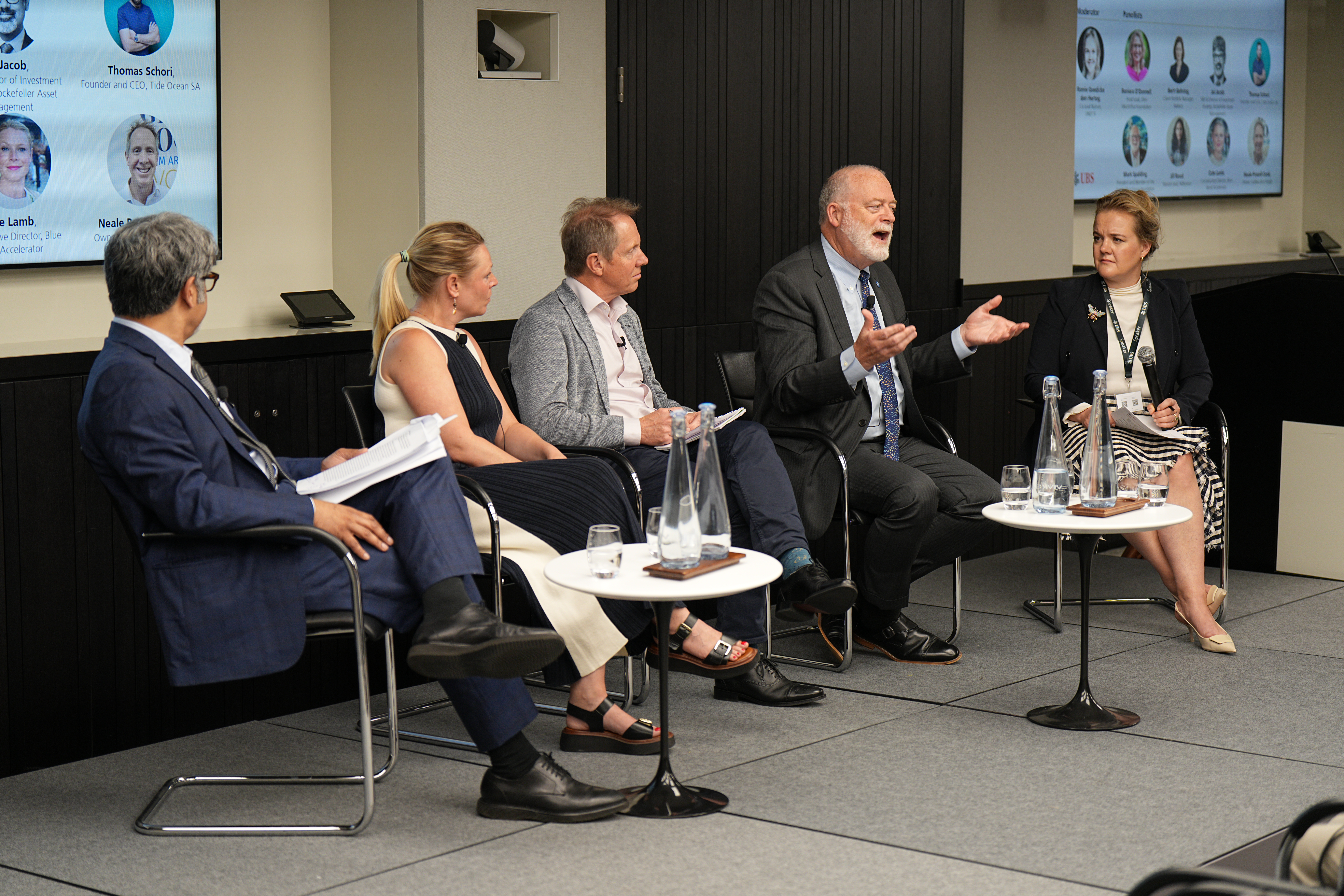The Ocean Foundation is the first “community foundation” for the oceans, with all the well-established tools of a community foundation and a unique focus on marine conservation. As such, The Ocean Foundation addresses two major obstacles to more effective marine conservation: a shortage of money and the lack of a venue in which to readily connect marine conservation experts to donors who wish to invest. Our mission is to support, strengthen, and promote those organizations dedicated to reversing the trend of destruction of ocean environments around the world.
President’s Message
Happy summer time! I hope you all have spent time on the water or at the beach to enjoy what we are all dedicated to protect. On July 1, 2006, The Ocean Foundation celebrated 3 years of successful marine conservation grantmaking. Over the past year, The Ocean Foundation doubled in size and regranted over one million dollars to marine conservation organizations domestically and internationally. The foundation staff has been busy attending conferences and educational meetings on protecting and preserving marine resources around the world. In the spring of 2006, we hosted introductory events in New York City and Washington, DC to let people know about the work of The Ocean Foundation and showcase the work of some of our grantees.
In late July, the Los Angeles Times began a five-day, five part series on our Altered Oceans. This outstanding multi-media approach to reporting includes five stories, but also excellent online photos, videos and special graphics. Accurate and compelling; it is a clear description that we have gone beyond warning signs, and into documenting change. We got into this horrible mess through lots of small actions. No one woke up one day and decided to create climate change and acidify the oceans. Instead, we decided to drive to the corner store instead of walk, we decided to use a less efficient appliance etc. Just as we got ourselves into this mess, so shall we get out — through lots of small actions and decisions and daily choices. The oceans can become healthier again and thus more resilient!
The good news is that the global attitude is shifting and citizens are becoming aware of the impact they have on the environment. This environmental consciousness combined with the affects of climate change is shifting the public’s investment priorities. Green building, technology, and giving are encouraging new trends. In the past three years, we have seen progress on the ground by the groups we fund. We know the oceans are still in trouble and need all the help they can get. From coastal development to bottom trawling to toxic chemicals in fish, we still have myriad issues to address. We thank all of you for your continued support for those that are working on the ground to produce positive change. We hope in our next three years that we can report on a brighter future for our ocean ecosystems and an increase in the amount of people dedicated to their protection.
Recent 2006 Investments by The Ocean Foundation
During the spring and summer of 2006, The Ocean Foundation highlighted the following projects, and made grants to support them:

New International Investment Opportunity
TOF closely monitors the forefront of ocean conservation work, searching for breakthrough solutions in need of funding and support, and communicating the most important new information to you.
Who: Zalul- Association for Environment & Preservation of the Red Sea
Where: Red Sea, Israel
What: Preservation of the Eilat reef in the Red Sea. The project includes ongoing monitoring and research regarding the condition of the reef; supervising the implementation of a governmental decision to remove polluting fish farming cages from the water; building local coalition promoting the preservation of the reef, conducting public campaigns and educational activities in order to raise public awareness of the issue and hold polluters publicly accountable.
Why: The coral reef in the Gulf of Eilat is the northernmost coral reef in the world and has been severely damaged due to different sources of pollution such as: the pipeline transporting crude oil, sewage from yachts, illegal and legal fishing practices around the coral reef and damage caused by divers and tourists. Data suggests that this threatened reef has 70% mortality. The underwater fish cages, which released mass quantities of nutrients into the marine ecosystem, have accounted for 97% of the nutrients and nitrates released into the Gulf waters, causing tremendous damage to the reef.
How: The Ocean Foundation’s Coral Reef Field-of-Interest Fund, which supports local projects that promote sustainable management of coral reefs and the species that depend on them, while seeking out opportunities to improve management for coral reefs on a much bigger scale.
TOF News
- Turtle researcher Boyd Lyon failed to resurface after attempting to capture and tag a 300 pound Green Sea Turtle off Florida on August 10th. At the request of friends and family, TOF has established the “Boyd Lyon Sea Turtle Fund.” Donations made to honor Boyd’s life work will be used to support research and conservation of these magnificent ocean creatures.
- Stay tuned for Jean-Michel Cousteau’s Ocean Adventures featured on PBS around the country including: Sharks at Risk, The Gray Whale Obstacle Course, and America’s Underwater Treasures.
- The Ocean Foundation welcomes six new science advisory board members: Dr. Nyawira Muthiga (Kenya), Dr. Paul J. Boyle (New York), Dr. Magnus Ngoile (Tanzania), Walter Parker (Alaska), Dr. Nirmal Jivan Shah (Seychelles) and Dr. Richard Steiner (Alaska).
- The Ocean Project, a public education and outreach program for zoos, aquariums, and other organizations, is now housed at The Ocean Foundation
- The Ocean Foundation established a new Alaska Oceans Fund for those interested in supporting the protection of Alaska’s marine resources.
- TOF produced reports on marine funding opportunities in Tanzania, Sudan and the Middle East.
- One of our newest TOF Advisory Board members, Richard Steiner, Ph.D. is off to Beirut (via military aircraft from Amman)– asked by the Lebanon Ministry of Environment (and other organizations, including the United Nations and the International Union for the Conservation of Nature) to advise on a 110,000 barrel oil spill into Mediterranean waters from an Israeli missile hit on the Jiyeh power plant. So far, the uncontained spill has oiled 81 miles of beach, damaging Lebanon’s once-beautiful sandy resort areas, impairing fisheries, and potentially endangering much more of the Mediterranean Sea. You can support his work to address this challenging spill via TOF’s Rapid Response FIF via our web page.
- TOF developed a new investment program for coastal resorts to give back to the communities they build in.
- Over the past 5 months TOF staff have traveled the globe meeting potential grantees in: Australia, Belize, Fiji, Greece, Mexico, St. Kitts & Nevis, the U.S. Virgin Islands, Alaska, California, Florida, Maine, Massachusetts, and New York.
How We Pick Our Investments
We begin by searching the globe for compelling projects. The factors which may make a project compelling include: strong science, strong legal basis, strong socio- economic argument, charismatic fauna or flora, a clear threat, clear benefits, and a strong/logical project strategy. Then, much like any investment advisor, we use a 21- point due diligence checklist, which looks at the project’s management, financing, legal filings and other reports. And, whenever possible we also conduct in person interviews with the key staff on site.
Obviously there are no more certainties in philanthropic investing than in financial investing. Therefore, The Ocean Foundation Research Newsletter presents both facts and investment opinions. But, as a result of nearly 12 years of experience in philanthropic investing as well as our due diligence on the selected featured projects, we are comfortable with making recommendations for projects that make a difference to ocean conservation.
Some Final Words
The Ocean Foundation is increasing the capacity of the ocean conservation field and bridging the gap between this time of growing awareness of the crisis in our oceans and true, implemented conservation of our oceans, including sustainable management and governance structures.
By 2008, TOF will have created an entirely new form of philanthropy (a cause-related community foundation), established the first international foundation focused solely on ocean conservation, and become the third largest private ocean conservation funder in the world. Any one of these achievements would justify the initial time and money to make TOF successful – all three make it a unique and compelling investment on behalf of the planet’s oceans and the billions of people who depend upon them for vital life support.
As with any foundation, our costs of operation are for expenses that either directly support grantmaking activities or direct charitable activities (such as attending meetings of NGOs, funders, or participating on boards, etc.).
Because of the added necessity of scrupulous bookkeeping, donor education, and other operational costs, we allocate about 8 to 10% as our administrative percentage. We expect a short term hike as we bring on new staff to anticipate our upcoming growth, but our overall goal will be to maintain these costs to a minimum, in keeping with our overarching vision of getting as much funding out to the field of marine conservation as possible.







